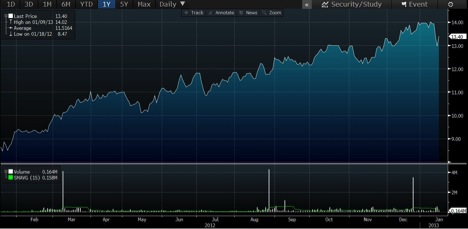McMillan Shakespeare
The recent share price fall (now partially recovered) in McMillan Shakespeare over the past week can largely be attributed to this article in The Australian.
In what feels like deja vu, in May 2009 the media speculated in relation to the possible removal of the FBT exemption in relation to salary sacrificed meal entertainment. History shows this turned out to be a non-event.
Current speculation is focused on benefits (tax breaks on cars, meals) provided to the not for profit sector – churches, public hospitals and charities etc. being abolished.
Not forgetting it is an election year and the number of constituents that would be angered would number around 1.4m, ‘broad sweeping reforms’ to fringe benefits tax are very unlikely.
Tax concessions for the not-for-profit sector are a critical part of the Australian Government’s support for the important work it undertakes. The alternative of abolishing ‘benefits’ able to be deducted from workers pre-taxable income would likely result in the Government ultimately having to increase pay rates to compensate for the loss. Something I am sure the Government is keen to avoid.
I do however agree with one of the matters raised. That the use of FBT exemptions for relatively high income professionals is unlikely to be supporting the sector in a meaningful way. Reviewing these concessions to ensure that support is provided to those who need it most would be a great outcome from the submissions, an outcome due in March 2013.
Should this occur and the Government caps certain FBT exemptions such as meals and entertainment, the move would simply bring these items in-line with other already existing benefit caps. So it’s not a change without precedent.
As to the impact such an action would have on McMillan Shakespeare’s earnings? It’s unlikely to be material. High level professionals would certainly be impacted, but only a small proportion of the ~290,000 employees under management would exceed a benefit cap of around $17,000 per annum.
A key sensitivity for MMS in their salary packaging business is the number of employees who pay the regular admin fee to have their tax position managed by the best in the business. For the majority of MMS’ clients the benefit cap would not be breached and hence, the monetary incentive in using McMillan’s management’s services would remain intact.
Whilst broad sweeping regulatory action is a definite risk that requires monitoring if you are in investor in McMillan Shakespeare (as we are), I don’t feel it’s an issue to be concerned about heading into 2013.
With any fallout likely to be quarantined, should the share price suffer as it did in 2009 on mere speculation of benefits being ‘abolished’, then this is a business worth tracking.
We are comfortable in holding McMillan Shakespeare for the longer-term. One has to ask, with all the free cash flow being generated by the business, is another acquisition of similar magnitude to Interleasing just around the corner? That’s something worth focusing on.
This post was contributed by a representative of Montgomery Investment Management Pty Limited (AFSL No. 354564). The principal purpose of this post is to provide factual information and not provide financial product advice. Additionally, the information provided is not intended to provide any recommendation or opinion about any financial product. Any commentary and statements of opinion however may contain general advice only that is prepared without taking into account your personal objectives, financial circumstances or needs. Because of this, before acting on any of the information provided, you should always consider its appropriateness in light of your personal objectives, financial circumstances and needs and should consider seeking independent advice from a financial advisor if necessary before making any decisions. This post specifically excludes personal advice.
INVEST WITH MONTGOMERY
tim clare
:
Hi Roger,
Quality business at a bargain price? If you believe that Rudd’s FBT changes will never see the light of day, this has to be a great opportunity…. or a massive gamble?!
Tim.
Peter Ralph
:
Interesting. In Money Magazine December/January issue Roger said “By 2014 intrinsic value should rise to about $12.” The stock closed at $13.50 today (23/1). Makes you wonder why you would hold particularly when there are so many A companies trading at significant discounts to their intrinsic values EG, FGE, MYE.